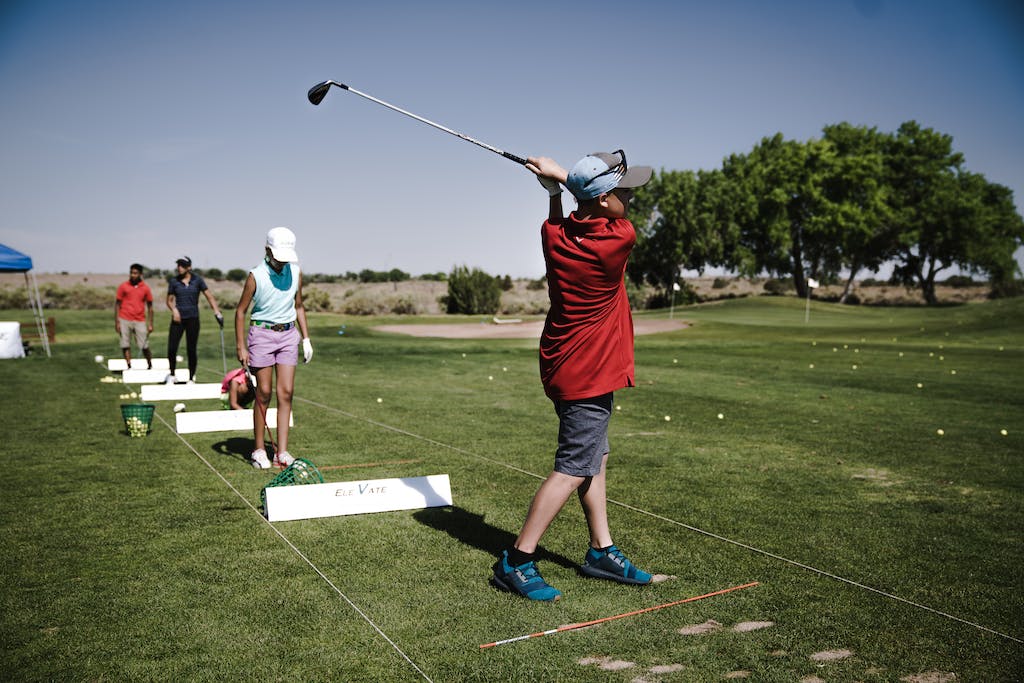How Can You Tell If Someone Is Good at Golf?
Welcome to our exploration of golf expertise! If you’ve ever wondered, “How can you tell if someone is good at golf?” – you’re in the right place.
This article will break down the clues and signals that reveal a golfer’s skill level. Whether you’re a golf enthusiast or just curious, let’s tee up and uncover the secrets to identifying a skilled golfer.

How Can You Tell If Someone Is Good at Golf?
Spotting a skilled golfer is about their swing consistency, precise putting, and strategic course management. A seasoned player often exhibits a smooth and controlled swing, accuracy in placing shots, and a strategic approach to navigating the course.
Additionally, a low handicap and consistent performance in various conditions are telltale signs of someone excelling at golf.
There are several factors to consider when you can tell if someone is good at golf.
1. The Basics of Golf
Golf is a game that requires precision, skill, and patience. It may seem simple at first glance – just hit a small ball into a hole – but mastering the basics takes time and practice.
One fundamental aspect of golf is the grip. How you hold the club can significantly impact your swing and overall performance. A proper grip ensures control and power in your shots.
Another crucial element to focus on is posture. Standing with good alignment allows for better balance and stability during your swing. Keeping your knees slightly bent, shoulders relaxed, and weight evenly distributed can significantly affect your game.
Swing mechanics are also essential to consider when evaluating someone’s golf skills. The basic components include backswing, downswing, impact, and follow-through. Each stage should be executed smoothly for maximum distance and accuracy.

Additionally, understanding different types of clubs and their uses is vital for success on the course. Knowing when to use each club can significantly affect shot selection and improve scores from drivers to putters.
Having an understanding of golf etiquette demonstrates respect for others on the course as well as an appreciation for the traditions of the sport. This includes things like not talking during someone’s swing or repairing divots on the green.
These foundational aspects contribute to determining whether someone possesses a strong foundation in golf. While mastering these basics alone does not guarantee excellence on the course, they provide a solid starting point for developing one’s skills further through practice, time, and experience.
2. Physical Attributes and Skills
When it comes to golf, physical attributes and skills play a crucial role in determining someone’s proficiency. While anyone can pick up a club and swing, certain qualities can indicate whether someone is truly good at the sport.
For starters, balance is key. A golfer with good balance will have a stable foundation during their swing, allowing for more consistent shots. Flexibility is also crucial as it enables players to achieve a full range of motion and generate power in their swings.
Additionally, strength plays a part in executing long drives off the tee. Strong muscles help golfers control their swing and generate speed at impact. It’s not just about raw power, though; having proper technique is equally vital.
Hand-eye coordination is another critical skill that separates the good from the great in golf. The ability to accurately judge distances and align shots requires excellent coordination between your eyes and hands.
Focus must be considered on the course. Golf demands mental concentration for hours at a time, so being able to stay focused despite distractions or setbacks is essential.
Evaluating someone’s physical attributes and skills can provide insights into their level of expertise in golf. Remember that these qualities are not definitive indicators but rather factors that contribute to overall performance on the course.
3. Mental Game and Strategy
Golf is not just a physical game. It’s also a mental battle. A good golfer knows how to stay mentally focused and calm under pressure. They can analyze the course, assess their strengths and weaknesses, and make strategic decisions that give them an edge over their competitors.
One key aspect of the mental game in golf is visualization. Top players are adept at visualizing each shot before they even step up to the ball. They can see themselves hitting the perfect drive down the fairway or sinking a difficult putt. By visualizing success, they build confidence and increase their chances of executing those shots successfully.
Another important mental skill in golf is managing emotions. Golf can be frustrating at times, with missed shots or bad breaks on the course. However, good golfers know how to control their emotions and maintain a positive mindset throughout the round. They don’t let one bad hole ruin their entire game; instead, they bounce back quickly and refocus on their next shot.

Furthermore, effective strategy plays a significant role in determining whether someone is good at golf. A skilled golfer understands when to play aggressively and conservatively based on various factors such as wind conditions, hazards on the course, and their abilities. They know how to choose which clubs to use for different distances or situations on each hole.
In addition to this strategic thinking during gameplay, top players also study courses beforehand to develop specific strategies tailored for each hole’s layout. This level of preparation allows them to anticipate challenges ahead of time and make informed decisions during actual play.
Being mentally strong and having well-thought-out strategies are crucial aspects that contribute towards someone being considered good at golf.
4. Experience and Practice
When determining if someone is good at golf, their experience and practice play a significant role. Golf is a sport that requires time and dedication to improve one’s skills.
Experienced golfers have spent countless hours honing their technique and understanding of the game. They have faced various challenges on different courses, which allows them to adapt quickly to other playing conditions.
Consistent practice helps golfers refine their swing mechanics, accuracy, and distance control. Practicing regularly improves physical skills and builds muscle memory for more consistent performance.
Furthermore, experienced players develop a deep understanding of the nuances of the game. They learn how to strategize effectively by assessing distances, selecting appropriate clubs for each shot, and making smart decisions based on course layout and obstacles.
Seasoned golfers often possess mental fortitude gained through years of competitive play. They remain calm under pressure situations like tournaments or high-stakes rounds with friends.
Experience and regular practice are essential in determining if someone is skilled at golf. With time invested in improving both physical abilities and strategic thinking on the course, individuals can significantly enhance their overall performance in this challenging sport.
5. Consistency and Course Management
Consistency and Course Management are crucial aspects of determining if someone is good at golf. Consistency refers to how well a golfer can repeat their swing, shot after shot. A good golfer will have a consistent swing to hit the ball straight and accurately.
Course management, on the other hand, involves making smart decisions while playing on the course. This includes knowing when to take risks and when to play it safe. Good golfers are adept at reading the course and adjusting their strategy accordingly.
One way to gauge consistency is by looking at a golfer’s scores over multiple rounds. If they consistently shoot low scores or improve steadily over time, it indicates that they have developed a level of consistency in their game.
Another consistent aspect is how well a golfer manages different shots under various conditions. Can they hit high shots into narrow greens? Can they shape their shots around obstacles? These skills demonstrate an ability to adapt and perform consistently across different situations.
Course management can be observed through watching how a golfer strategizes during play. Do they make smart club choices based on distance and hazards? Do they consider wind direction before selecting their target line? How do they handle difficult lies or unfamiliar terrain?
Assessing someone’s golf consistency requires observing technical skills and decision-making abilities. By examining factors such as scoring trends, shot execution in diverse scenarios, and strategic thinking, we can determine if someone possesses these qualities necessary for success in this challenging sport.
6. Observation and Analysis of a Golfer’s Performance
Observation and analysis play a crucial role in determining whether someone is good at golf. To truly understand a golfer’s performance, you must pay close attention to their technique, decision-making abilities, and overall approach to the game.
Observation of a golfer’s swing can reveal much about their skill level. A good golfer will have a smooth and consistent swing with proper form. They will maintain balance throughout the motion and generate power from their hips and core.
Additionally, analyzing a player’s shot selection can provide insights into their strategic thinking on the course. A skilled golfer considers factors such as wind direction, hazards, and pin placement when deciding which club to use and where to aim.
Furthermore, observing how a player handles pressure situations is key. Good golfers remain calm under stress and make intelligent decisions rather than letting emotions control their game.
Another aspect worth noting is consistency. Paying attention to how consistently someone performs well or struggles can indicate their proficiency in the sport.
Watching how adeptly a golfer manages the course reveals much about their understanding of angles, distances, slopes, and other factors that come into play during gameplay.

Conclusion
How can you tell if someone is good at golf is like solving a puzzle. You need to look closely at how they swing, stand, and make decisions on the course. A good golfer gets these basics right, from holding the club to moving smoothly. Their body skills, like balance and hand-eye coordination, also play a big part in their success.
Think of it like a mental game too – a skilled player stays focused and confident. They make smart decisions based on the course and their own abilities. Experience helps them pick the right club and read the greens well. If a golfer can consistently hit shots with precision and handle the course well, that’s a sign of their skill.
So, the next time you’re watching someone play golf, keep an eye out for these things. It’s like unlocking the secrets to what makes a great golfer. Enjoy your time on the course!






